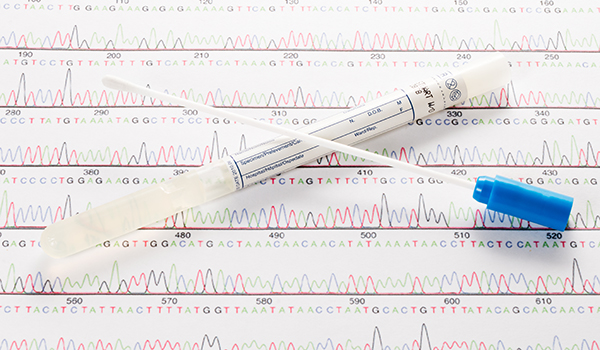Which Genetic Health Risks Should I Worry About?

Have you heard about at-home kits that screen your genes for disease risk? All you do is send off a saliva sample to a company to find out whether you’re genetically predisposed to get certain illnesses.
Doctors having been ordering genetic health-risk tests for years. What’s new is your ability to find out some genetic predispositions without a doctor involved. Last year, the U.S. Food and Drug Administration approved 23andMe’s genetic testing kit for 10 diseases and conditions. This year, the FDA granted approval for 23andMe to market a genetic test for three mutations that increase breast cancer risk in a small portion of the population. Other companies offer DNA tests have a more generic focus, such as HomeDNA’s food and pet sensitivity test.
Not surprisingly, more and more patients at my family practice in Alexandria, Virginia, are asking me about these tests. In general, my colleagues and I at Franconia Family Medicine don’t recommend them – at least not as a primary way to take control of your health. That’s because most of today’s direct-to-consumer tests show whether you have an increased risk for diseases that you can’t do much to prevent.
One example is late-onset Alzheimer’s disease. Right now, there’s nothing you can do to stop it from happening. Plus, even if a genetic test says you’re at increased risk for late-onset Alzheimer’s, that doesn’t guarantee you will get it. The upshot: A lot of worry for no reason – and with no good solution.
If you wonder which genetic health risks you should worry about, start with a visit to your primary care provider. It’s our job to have a complete picture of your health, plus knowledge of diseases that run in your family. That means we are in a better position to tell you how to prevent disease than a one-size-fits-all genetic test. (It may also mean that we recommend specific genetic testing.)
These are some of the most common diseases that have a strong genetic component, and fortunately, there are steps you can take to lower your risk.
Type 2 Diabetes
A lot of people think type 2 diabetes only happens if you eat junk food and are overweight. While exercise and diet play important roles, research shows that several genes are associated with the disease. That helps explain why some people who are thin develop it. According to the renowned Joslin Diabetes Center, 15% of the U.S. population with type 2 diabetes have a normal body mass index.
Even with a genetic predisposition, you can still lower your risk or even reverse type 2 in some cases:
- Get down to a healthy weight.
- Commit to regular exercise, including strength training.
- Choose carbs that are low on the glycemic index (legumes, fruits, vegetables) over ones that rank high, such as sweets, baked goods, and white pasta and bread.
Heart Disease
Like type 2 diabetes, heart disease can be caused by both lifestyle and genetics. While you can’t change your genes, there are numerous things you can do to adjust your lifestyle. Some goals recommended by The American Heart Association:
- Get your blood pressure, body mass index, and cholesterol levels within a healthy range.
- Do some form of exercise every day.
- Strive for a healthier diet. Quit cigarettes or other forms tobacco.
Breast and Ovarian Cancer
Wondering if you have a genetic predisposition for these cancers? Ask your doctor if you’re a good candidate for genetic testing, as some genetic mutations (BRCA1, BRCA2) are associated with increased risk. If you do have either of these mutations, you’ll want to talk to your doctor and/or a genetic counselor about how to keep cancer at bay. Options may include:
- Regular ovarian cancer screenings.
- Removal of the ovaries and fallopian tubes.
- Prophylactic mastectomy (removing breasts before breast cancer develops).
There are many other diseases and conditions that have a genetic component as well. Mental health problems, asthma, high blood pressure, some forms of arthritis, and even obesity are among these. If you want to know which genetic health risks could affect you, don’t look to a mail-in genetic test. Talk to your primary care doctor, who can help you understand your risks and stay as healthy as possible.

